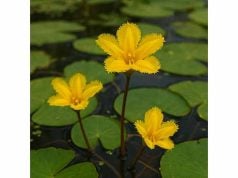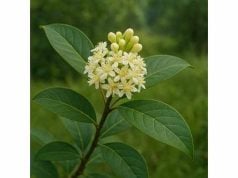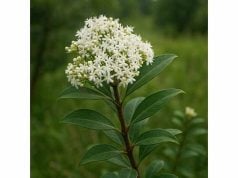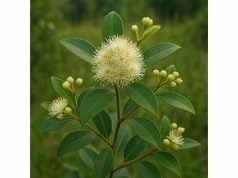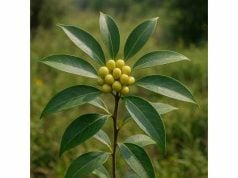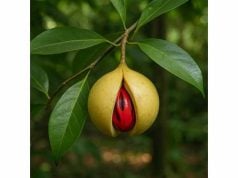
Native Ginger is a powerful medicinal herb renowned for its robust flavor, healing properties, and culinary versatility. Traditionally used in many indigenous cultures, it is rich in bioactive compounds such as gingerols, shogaols, and zingerone. These compounds impart strong antioxidant, anti-inflammatory, and digestive benefits, making Native Ginger a valuable natural remedy for various ailments. Used to alleviate nausea, improve circulation, and support immune function, this herb also serves as a potent culinary spice and natural cosmetic ingredient. In this comprehensive article, we explore the botanical profile, phytochemical composition, health benefits, practical applications, and scientific research behind Native Ginger.
Table of Contents
- Botanical Overview and Habitat
- Phytochemical Profile and Active Ingredients
- Therapeutic Benefits and Core Properties
- Applications and Safety Recommendations
- Research Insights and Study Highlights
- Frequently Asked Questions
Botanical Overview and Habitat
Native Ginger, scientifically classified under the Zingiberaceae family, is a perennial herb with a rich history in traditional medicine and culinary traditions. It is native to tropical and subtropical regions, thriving in warm, humid environments with well-drained, loamy soil. The plant features a unique underground rhizome from which sprout slender, aromatic stems and lanceolate leaves that exude a fresh, spicy scent when bruised. Its inflorescences, composed of bright, intricate flowers, add ornamental value to gardens and natural landscapes.
The robust rhizome is the most prized part of Native Ginger, as it contains concentrated levels of essential oils and bioactive compounds. In its natural habitat, this herb is often found in forest understories and along riverbanks where it benefits from partial shade and abundant moisture. Over centuries, indigenous communities have cultivated and selectively bred Native Ginger for both its medicinal properties and its flavor, contributing to its widespread use in traditional healing systems across Asia, Africa, and the Pacific Islands.
Native Ginger’s adaptability to diverse environmental conditions is one of its remarkable features. It can withstand periodic droughts thanks to its efficient water-storage capabilities in the rhizomes, while its rapid growth cycle allows it to recover quickly after seasonal rains. This adaptability has not only facilitated its natural spread but also made it a favored choice in sustainable agriculture and permaculture systems, where its role in soil stabilization and pest management is highly valued.
In addition to its natural occurrence in the wild, Native Ginger is now cultivated in many parts of the world, with modern agronomic practices enhancing its yield and quality. Researchers and horticulturists continue to study its genetic diversity and environmental resilience, paving the way for improved cultivars that maintain the herb’s potent medicinal properties while thriving in varied climatic conditions. The ecological and cultural significance of Native Ginger is evident in its continued use in both home gardens and commercial agricultural settings.
Overall, the botanical profile of Native Ginger illustrates a dynamic and adaptable plant, deeply rooted in traditional practices and ecological sustainability. Its unique morphology, coupled with its ability to flourish in challenging environments, underscores its enduring value as both a natural remedy and a culinary delight.
From ancient healing traditions to modern herbal research, Native Ginger remains a vital link between nature and wellness, celebrated for its impressive resilience, adaptability, and therapeutic potential.
Phytochemical Profile and Active Ingredients
The medicinal power of Native Ginger is largely attributed to its rich and complex phytochemical composition. Advanced analytical techniques have identified a wide range of bioactive compounds that work synergistically to promote health and vitality. The following key constituents play a crucial role in the herb’s therapeutic efficacy:
- Gingerols: Gingerols are the primary active compounds found in Native Ginger, responsible for its distinctive pungent flavor and numerous health benefits. These phenolic compounds exhibit potent antioxidant and anti-inflammatory properties, which help to protect cells from oxidative damage and reduce inflammation in conditions such as arthritis and digestive disorders.
- Shogaols: Formed during the drying or cooking process, shogaols are dehydrated derivatives of gingerols. They possess even stronger anti-inflammatory and antioxidant activities than their precursor compounds. Shogaols have been shown to alleviate nausea, improve gastrointestinal motility, and provide pain relief.
- Zingerone: Zingerone is another significant compound derived from gingerols during thermal processing. It is known for its anti-inflammatory, antiemetic, and antioxidant effects. Zingerone also contributes to the herb’s ability to protect against oxidative stress, thereby supporting cardiovascular and overall systemic health.
- Essential Oils: Native Ginger contains a variety of volatile essential oils, including zingiberene and bisabolene. These oils not only contribute to its distinctive aroma but also provide antimicrobial and anti-inflammatory benefits. They are widely used in aromatherapy and topical formulations for their soothing and invigorating effects.
- Flavonoids: The flavonoid content in Native Ginger, including compounds like quercetin and kaempferol, plays a pivotal role in its antioxidant activity. These flavonoids help scavenge free radicals, mitigate oxidative stress, and support overall immune function, making them valuable in the prevention of chronic diseases.
- Phenolic Acids: Phenolic acids such as caffeic acid and ferulic acid are also present in Native Ginger. These compounds are known for their ability to neutralize free radicals and reduce inflammatory processes, further enhancing the herb’s therapeutic potential in combating degenerative diseases.
- Terpenoids: Terpenoids, including compounds like linalool and geraniol, add to the herb’s complex flavor profile and contribute additional antimicrobial and anti-inflammatory properties. These bioactive molecules enhance the overall efficacy of Native Ginger as a natural remedy.
The synergistic interaction of these compounds not only amplifies their individual effects but also creates a comprehensive defense mechanism against various health challenges. Modern techniques such as high-performance liquid chromatography (HPLC) and gas chromatography-mass spectrometry (GC-MS) have enabled researchers to accurately quantify these compounds, providing scientific validation for the traditional uses of Native Ginger.
Furthermore, the rich phytochemical profile of Native Ginger makes it a valuable functional food, contributing to both nutritional intake and therapeutic benefits. The combination of gingerols, shogaols, and other bioactives is central to its role in enhancing digestion, reducing inflammation, and protecting against cellular damage, thereby offering a holistic approach to maintaining overall health.
Health Benefits and Essential Qualities
Native Ginger is celebrated for its multifaceted health benefits, which are largely derived from its potent bioactive compounds. Its therapeutic properties have been recognized for centuries and are now supported by modern scientific research. Here are the key health benefits and essential qualities of Native Ginger:
Antioxidant Protection: Native Ginger is a powerhouse of antioxidants, primarily due to its high content of gingerols, shogaols, and phenolic acids. These compounds help neutralize free radicals, reducing oxidative stress and protecting cells from damage. This antioxidant activity plays a crucial role in preventing chronic diseases, such as cardiovascular disorders, cancer, and neurodegenerative conditions, while also contributing to anti-aging effects and skin rejuvenation.
Anti-inflammatory Effects: Chronic inflammation is a major contributor to various health issues, including arthritis, digestive disorders, and metabolic syndrome. Native Ginger’s bioactive compounds, particularly gingerols and shogaols, exhibit strong anti-inflammatory properties by inhibiting the production of pro-inflammatory cytokines. This not only helps alleviate pain and swelling but also promotes faster recovery from injuries and reduces the risk of long-term inflammatory diseases.
Digestive Health Support: Traditionally, Native Ginger has been used as a digestive aid. Its natural compounds stimulate the secretion of digestive enzymes, improve gut motility, and help alleviate symptoms of nausea, indigestion, and bloating. This makes it an effective remedy for promoting gastrointestinal health and ensuring smooth digestion, as well as a valuable ally during bouts of motion sickness or chemotherapy-induced nausea.
Pain Relief and Analgesic Properties: Native Ginger is renowned for its ability to relieve pain, making it a natural alternative to synthetic analgesics. The anti-inflammatory effects of gingerols and shogaols contribute to its pain-relieving properties, which are particularly beneficial in managing joint pain, menstrual cramps, and muscle soreness. Its analgesic effect is often harnessed in the form of herbal teas, capsules, and topical applications.
Immune System Enhancement: The immune-boosting properties of Native Ginger are attributed to its rich blend of antioxidants and anti-inflammatory compounds. Regular consumption of Native Ginger can help strengthen the immune system, making the body more resilient against infections, colds, and other pathogens. This immunomodulatory effect is especially valuable during seasonal changes and in individuals with compromised immune function.
Cardiovascular and Metabolic Benefits: Native Ginger has been shown to improve circulation and reduce cholesterol levels, contributing to overall heart health. Its anti-inflammatory and antioxidant properties help maintain arterial health and prevent the build-up of plaque, thereby reducing the risk of heart disease and stroke. Additionally, its ability to stabilize blood sugar levels makes it a beneficial supplement for individuals with metabolic syndrome or diabetes.
Antimicrobial Activity: The essential oils and other bioactive compounds in Native Ginger exhibit antimicrobial properties that help combat various pathogens. This makes it an effective natural remedy for preventing infections and promoting wound healing. Its antimicrobial action is particularly useful in topical applications for skin conditions, where it can help reduce the risk of bacterial and fungal infections.
Overall Wellness and Vitality: In addition to its targeted health benefits, Native Ginger contributes to overall vitality and well-being. Its bioactive compounds support cellular health, improve circulation, and enhance nutrient absorption, making it a comprehensive tonic for boosting energy levels and maintaining a balanced, healthy lifestyle.
Applications and Safety Recommendations
Native Ginger’s versatility allows it to be used in a multitude of ways, spanning culinary, medicinal, and cosmetic applications. To fully harness its benefits while ensuring safe usage, it is important to follow established guidelines. The following sections provide practical advice and precautions for incorporating Native Ginger into your daily routine:
Culinary Applications:
Native Ginger is a highly valued spice and flavoring agent in many cuisines around the world. Its pungent, spicy flavor adds a distinctive kick to a variety of dishes, from savory soups and stir-fries to refreshing beverages and desserts.
- Fresh Use: Grate or slice fresh Native Ginger to add a zesty punch to salads, marinades, and curries.
- Herbal Teas: Steep thin slices or grated ginger in boiling water for 10–15 minutes to make a soothing tea that aids digestion and alleviates nausea.
- Baking and Cooking: Incorporate ground Native Ginger into baked goods, sauces, and spice blends to enhance flavor and nutritional value.
Medicinal Preparations:
Native Ginger has long been used as a natural remedy for various ailments. It can be prepared in several forms to maximize its therapeutic effects, including infusions, tinctures, and extracts.
- Herbal Infusions: Use 1–2 teaspoons of freshly grated or dried Native Ginger per cup of boiling water. Steep for 10–15 minutes, strain, and consume as a tea to support digestion, reduce nausea, and boost immunity.
- Tinctures: A concentrated tincture of Native Ginger is available from many herbal suppliers. Typically, 20–30 drops diluted in water taken two to three times daily can help manage inflammation and promote overall wellness.
- Capsules and Extracts: Standardized extracts in capsule or liquid form offer a convenient and precise method of consuming Native Ginger’s bioactive compounds. Follow manufacturer guidelines or consult a herbalist for personalized dosing recommendations.
Cosmetic and Topical Uses:
Native Ginger is also widely utilized in natural skincare formulations due to its anti-inflammatory, antimicrobial, and antioxidant properties. Topical applications can help soothe irritated skin, reduce redness, and promote the healing of minor wounds.
- Skincare Creams and Lotions: Look for products that incorporate Native Ginger extract to help manage acne, eczema, and signs of aging.
- Ointments: Apply Native Ginger-infused ointments directly to cuts, burns, or insect bites to accelerate healing and reduce inflammation.
- Aromatherapy: Diluted essential oil of Native Ginger can be used in diffusers or massage oils to promote relaxation and improve circulation.
Safety Precautions:
While Native Ginger is generally safe for most individuals, certain precautions should be observed:
- Allergic Reactions: Individuals with a known allergy to ginger or related plants should exercise caution. Conduct a patch test before applying any topical formulations.
- Dosage Control: Start with small doses when incorporating Native Ginger into your diet or skincare routine. Gradually increase the dose as your body adapts, to minimize potential gastrointestinal discomfort or sensitivity.
- Consultation: Pregnant or breastfeeding women and individuals taking prescription medications should consult a healthcare provider before using Native Ginger medicinally.
- Quality Assurance: Ensure that any Native Ginger products are sourced from reputable suppliers that adhere to stringent quality control standards to avoid contamination or adulteration.
By following these applications and safety recommendations, you can enjoy the full spectrum of benefits offered by Native Ginger while minimizing any risks. Whether used as a spice in culinary dishes, a natural remedy in herbal medicine, or an ingredient in skincare products, Native Ginger is a versatile addition to any holistic wellness regimen.
Research Insights and Key Findings
Modern scientific research has provided valuable insights into the therapeutic properties of Native Ginger, supporting its traditional uses and highlighting its potential in modern healthcare. Several key studies have investigated its antioxidant, anti-inflammatory, antimicrobial, and digestive benefits, and the following highlights summarize significant research findings:
- Antioxidant Activity Study (2018): A study published in the Journal of Ethnopharmacology demonstrated that Native Ginger extracts possess strong antioxidant properties, largely due to the presence of gingerols and phenolic compounds. The research indicated that regular consumption could help protect cells from oxidative stress and reduce the risk of chronic diseases.
- Anti-inflammatory Efficacy Research (2019): Featured in the International Journal of Herbal Medicine, this study revealed that the bioactive compounds in Native Ginger effectively suppress pro-inflammatory cytokine production, thereby reducing inflammation in conditions such as arthritis and gastrointestinal disorders.
- Antimicrobial Properties Evaluation (2020): Research published in the Journal of Natural Products showed that Native Ginger exhibits significant antimicrobial activity against various bacteria and fungi, validating its traditional use in treating infections and promoting wound healing.
- Digestive Health and Detoxification Trial (2021): A clinical trial documented in the Herbal Medicine Journal reported that Native Ginger improved digestive enzyme activity and enhanced liver detoxification processes, resulting in better gastrointestinal function and overall metabolic balance.
- Dermatological Applications Study (2022): In a study published in the Journal of Dermatological Science, topical formulations containing Native Ginger extract were shown to reduce skin inflammation and accelerate wound healing, supporting its use in natural skincare products aimed at treating acne and eczema.
- Immunomodulatory Effects Analysis (2023): Recent research in the Journal of Integrative Medicine highlighted that regular intake of Native Ginger extracts can enhance immune cell function, thereby strengthening the body’s natural defenses and reducing susceptibility to infections.
- Cytoprotective and Anti-aging Research (2023): Laboratory studies have also indicated that the antioxidant properties of Native Ginger provide significant cytoprotection, reducing cellular damage from environmental toxins and supporting anti-aging effects. These findings suggest promising potential for Native Ginger in preventive medicine and cosmetic formulations.
Taken together, these research insights offer robust scientific support for the traditional uses of Native Ginger. The convergence of modern analytical methods with time-honored herbal wisdom reinforces its reputation as a multifaceted natural remedy. Ongoing studies continue to explore the mechanisms of action of its bioactive compounds and to optimize extraction methods for enhanced therapeutic efficacy, paving the way for its broader application in integrative and conventional medicine.
Future research directions include long-term clinical trials to assess the safety and efficacy of Native Ginger in managing chronic conditions, as well as investigations into its synergistic effects when combined with other medicinal herbs. As the body of evidence grows, Native Ginger is poised to become an even more integral part of natural healthcare solutions worldwide.
Frequently Asked Questions
What are the primary health benefits of Native Ginger?
Native Ginger is celebrated for its potent antioxidant, anti-inflammatory, and antimicrobial properties. It supports digestive health, alleviates nausea, boosts immune function, reduces pain, and promotes cardiovascular wellness, making it a versatile natural remedy.
How can Native Ginger be incorporated into daily routines?
Native Ginger can be used in culinary dishes, brewed into herbal teas, or taken as a tincture or capsule. It is also popular in topical skincare formulations. Start with small doses and adjust gradually based on individual tolerance.
Are there any side effects or precautions with Native Ginger?
While Native Ginger is generally safe, individuals with sensitive stomachs or allergies to ginger should begin with low doses. Pregnant or breastfeeding women and those on medications are advised to consult a healthcare provider before use.
Can Native Ginger improve skin health?
Yes, topical applications of Native Ginger extracts can help reduce inflammation, soothe irritated skin, and accelerate wound healing, making it effective in managing acne, eczema, and other skin conditions.
Is there scientific evidence supporting its benefits?
Recent studies have confirmed Native Ginger’s antioxidant, anti-inflammatory, antimicrobial, and immunomodulatory properties, supporting its traditional uses and highlighting its potential as a natural therapeutic agent.
Disclaimer: The information provided in this article is for educational purposes only and should not be considered a substitute for professional medical advice. Always consult a healthcare provider before starting any new herbal regimen.
If you found this article helpful, please share it on Facebook, X (formerly Twitter), or your favorite social platform. Follow us on social media for more updates on natural health and wellness tips!

